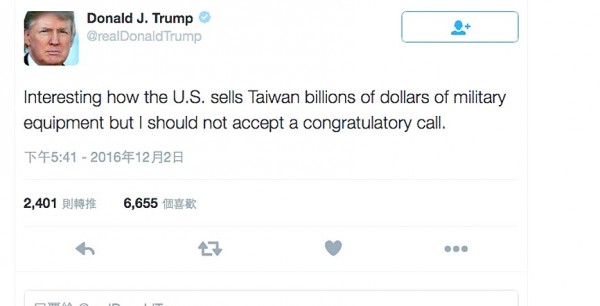《TAIPEI TIMES 焦點》 Tsai-Trump Phone Call: REPORTER’S NOTEBOOK: Beijing fish out of water after groundbreaking call

A screen grab from US president-elect Donald Trump’s Twitter account shows the second of two tweets sent by Trump following his telephone conversation with President Tsai Ing-wen on Friday. Screen grab from US president-elect Donald Trump’s Twitter account
By Su Yung-yao / Staff reporter
The telephone call between President Tsai Ing-wen (蔡英文) and US president-elect Donald Trump has put Beijing — still preoccupied with adjusting to the prospect of a Trump administration — in a predicament that has so far exceeded Beijing’s ability to react.
The telephone conversation, which took place on Friday and lasted for a little more than 10 minutes, was the first publicly reported call between a Taiwanese leader and a US president or president-elect since 1979, when Washington switched recognition from Taipei to Beijing.
During the US presidential campaign, Chinese media and Internet users gave Trump’s candidacy a more positive response than that of former US secretary of state Hillary Rodham Clinton, who implemented US President Barack Obama’s “rebalance” or “pivot” to Asia.
However, not only did Trump on Friday answer Tsai’s call, he also addressed her as “the president of Taiwan,” sending shock waves through Beijing, where officials appear to have been caught wrong-footed.
Beijing’s surprise is evident in its initial handling of the situation, which amounted to placing the blame on Taipei.
Chinese Minister of Foreign Affairs Wang Yi (王毅) and China’s Taiwan Affairs Office spokesperson Ma Xiaoguang (馬曉光) described the call as “a trick by Taiwan,” and said it would not affect the overall substance of the US’ “one China” policy.
Beijing knows full well that any two-way telephone communication between heads of state requires cooperation on both ends. Tsai’s 10-minute talk with Trump was clearly prearranged by the staff of both sides.
For nations that are trying to decipher the Trump administration’s overall foreign policy direction, the call is ample evidence that a direct channel of communication has been opened by Taipei and the national security advisers of Trump’s presumptive Cabinet.
It is interesting that while the Presidential Office in Taipei has remained relatively low-key about the call, Trump’s team has issued news statements and Trump made repeated comments on Twitter and Facebook to hit back against accusations from the US media that he had challenged Washington’s long-standing “one China” policy.
These moves suggest that Trump answering Tsai’s call was not a spur-of-the-moment decision; instead, it was a premeditated action by the Trump team that hints at his direction of US policy in the Asia-Pacific region.
Trump has expressed his opposition to multilateral trade agreements on multiple occasions and he promised that withdrawing the US from the Trans-Pacific Partnership would be one of his first official acts. The comments have led to fears from US allies and partners in the Asia-Pacific region, such as Japan, that the US might withdraw its influence from the region and China might exploit the power vacuum.
Therefore, Trump’s talk with Tsai served to highlight Taiwan-US relations and reassure the international community of the Trump administration’s commitment to traditional US allies and partners.
It further showed Beijing that the US would continue its crucial role in Asia.
Although the US media has panned Trump for challenging the “one China” policy that has been the long-standing convention in Washington, US pundits are mistaken. The “one China” policy is by no means identical to China’s “one China” principle. While Beijing sees Taiwan as a part of China, the US merely “acknowledges” Beijing’s position, without accepting or recognizing the validity of its claims.
This crucial distinction is the reason Taiwan-US relations havecontinued to grow.
Even as the Chinese government continues its denial that the Tsai-Trump call would affect the international community’s acceptance of its version of “one China,” Trump is emphatically at work redefining what exactly “one China” means.
Translated by Jonathan Chin
新聞來源:TAIPEI TIMES













